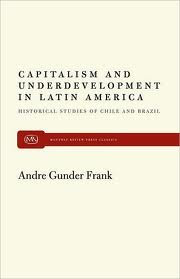This biographical note,
from theInternational Institute for Social History, was
adapted and updated in Spring 2002.
He was educated at the University of Chicago,
where he received his Ph.D. in Economics in 1957 with a dissertation on Soviet
Agriculture. From 1957 until 1962 he was lecturer and Assistant Professor at
the universities of Michigan, Iowa and Wayne State. In 1962 he went to Latin
America and became Associate Professor at the University of Brasilia teaching
anthroplogical theory. Then he became Extraordinary Professor at the National
School of Economics of the National Autonomous University of Mexico in 1965.
From 1966 until 1968 he was Visiting Professor at the Departments of Economics
and History of the Sir George Williams University, Montreal, Canada. In 1968 he
became Professor at the Department of Sociology and the Faculty of Economics,
University of Chile, Santiago, Chile, where he was involved in the reforms of
the Salvador Allende administration. After the military coup in 1973 he escaped
to Europe, where he became Visiting Research Fellow at the Max-Planck Institute
in Starnberg, Germany, from 1974 until 1978. In that year he moved to Norwich,
England, where he was appointed Professor of Development Studies at the School
of Development Studies, University of East Anglia. From 1981 he was also
Professor of Development Economics and Social Sciences at the University of
Amsterdam, to where he definitely moved in 1983. Besides he had many other temporary
visiting appointments and research appointments in among others the USA,
Brazil, Chile, Mexico, Belgium, Germany and France. In 1994, at the age of 65,
Frank went into mandatory retirement from his professorship in the Faculty of
Economics at the University of Amsterdam.
Andre Gunder Frank has written widely on the
economic, social and political history and contemporary development of the
world system, the industrially developed countries, and especially of the Third
World and Latin America. He has produced over 1000 publications in 30
languages, including 43 book titles in 140 different language editions, and
160+ printings, 169 chapters contributed to 145 books edited by others and a
couple by himself, and some 400 articles published in over 600 issues of
academic journals, more popular ones, and newspapers. For that reason, he must
now regard himself as also being ir/responsible for the waste of it is
difficult to estimate how many trees to provide paper for these countless
printed pages. Bibliographies of Frank's publications can be found in IISG folder 134, as well as the Publications section and especially in the Bibliography of 880 Publications 1955-1995.
Teaching and Research
Appointments
Visiting Professor, Dipartimento di Sociologia
Senior Fellow, World History Center
Visiting Professor of History
Visiting Professor of International Studies
Visiting Distinguished Professor of International Studies
Graduate Faculty [Sociology]
Professor of Development Economics & Social Sciences
Professor of Development Studies in Social Change
Visiting Research Fellow
Professor of Sociology and Economics
Visiting Professor of History and Economics
Visiting Professor of Economics
Associate Professor of Anthropology
Lecturer and then Assistant Professor of Economics
Instructor of Economics
1990 UNESCO Silk Roads Expedition, Xinjiang, China
1988 University of Minnesota, Exchange Prof. of History
1986 Chinese Academy of Social Sciences Visiting Fellow
1983 UNESCO & Chinese Academy Social Sciences Consultant
1981 New School for Social Research, New York, USA
1979 Boston University, USA, Visiting Prof. of Sociology
1978 University of Paris VIII, France
1973 Free University of Berlin, Germany
1971 Catholic University of Louvain, Belgium
1968 UN International Labour Organisat.Field Office,Chile
1964 UN Economic Commission of Latin America Consultant VITIES
Visiting Professor, Dipartimento di Sociologia
Senior Fellow, World History Center
Visiting Professor of History
Visiting Professor of International Studies
Visiting Distinguished Professor of International Studies
Graduate Faculty [Sociology]
Professor of Development Economics & Social Sciences
Professor of Development Studies in Social Change
Visiting Research Fellow
Professor of Sociology and Economics
Visiting Professor of History and Economics
Visiting Professor of Economics
Associate Professor of Anthropology
Lecturer and then Assistant Professor of Economics
Instructor of Economics
1990 UNESCO Silk Roads Expedition, Xinjiang, China
1988 University of Minnesota, Exchange Prof. of History
1986 Chinese Academy of Social Sciences Visiting Fellow
1983 UNESCO & Chinese Academy Social Sciences Consultant
1981 New School for Social Research, New York, USA
1979 Boston University, USA, Visiting Prof. of Sociology
1978 University of Paris VIII, France
1973 Free University of Berlin, Germany
1971 Catholic University of Louvain, Belgium
1968 UN International Labour Organisat.Field Office,Chile
1964 UN Economic Commission of Latin America Consultant VITIES



